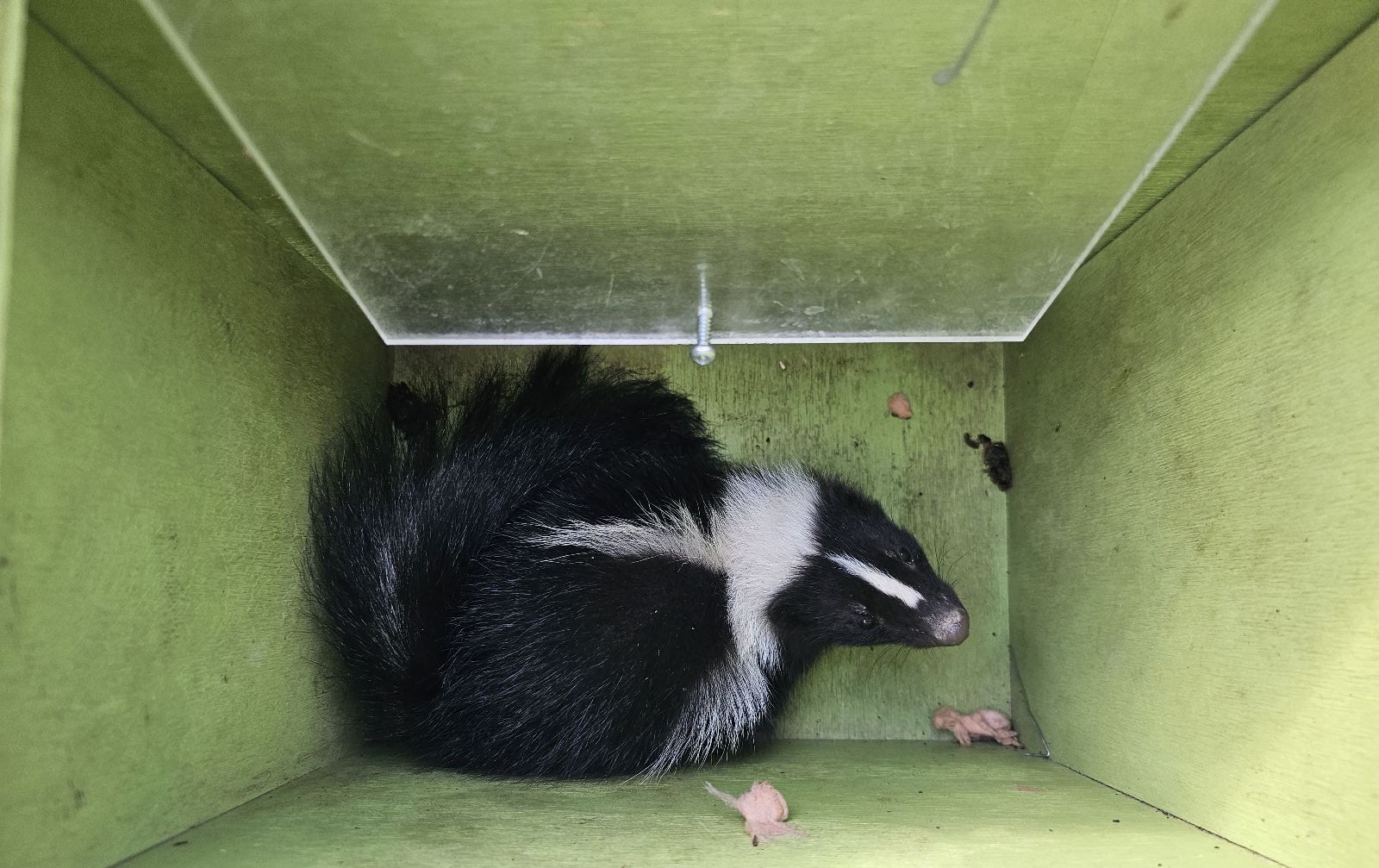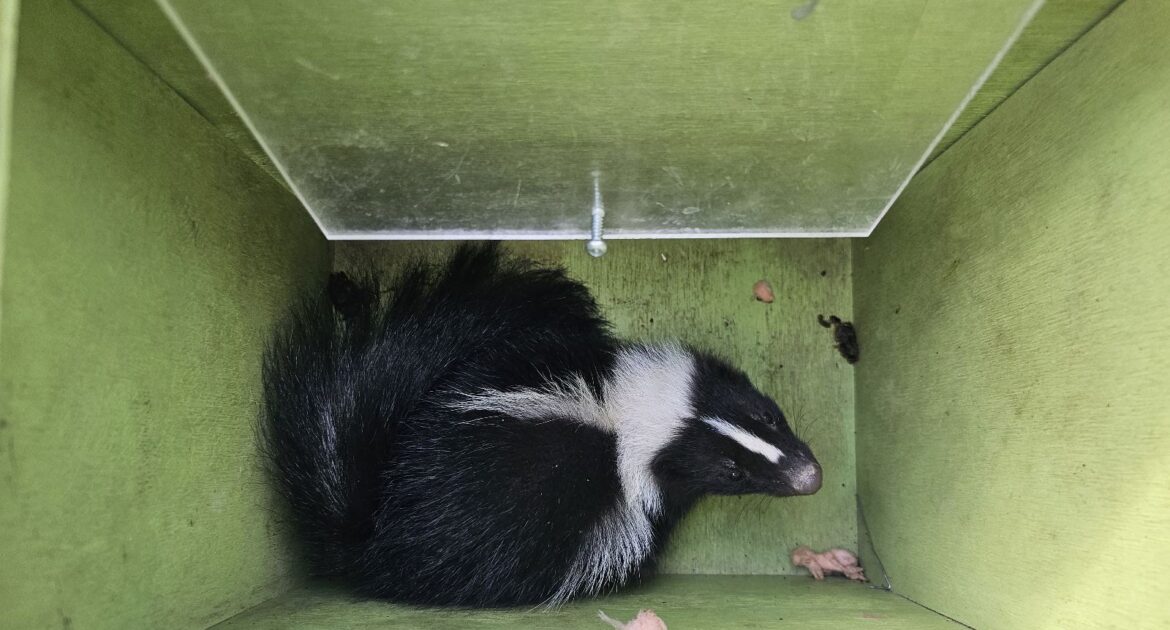Most homeowners don’t think much about skunks until they start seeing (or smelling) them around their property. At Skedaddle, we’ve fielded countless calls about these fascinating creatures, from questions about what skunks eat to concerns about skunk behavior explained in the context of their destructive habits. Many homeowners right here in Hennepin County are especially curious about how to prevent skunk activity.
If you’ve been noticing skunks near your property or are just looking to understand them better, keep reading. We’ll break down skunks’ eating habits, denning preferences, and answer your most pressing questions, all while sharing practical tips to protect your home.
What Do Skunks Eat?
Skunks are opportunistic omnivores, which means their diet includes both plants and animals. Their dining preferences change with the seasons, but one thing remains constant: they will eat whatever is easiest to find.
Here’s a closer look at what’s typically on their menu:
- Small Mammals: Skunks commonly hunt mice, moles, and voles. They are efficient diggers and use their claws to extract these animals directly from their nests or burrows.
- Insects: Grasshoppers, beetles, crickets, and larvae are among their favorite foods. They’ll even roll caterpillars on the ground to remove their protective hairs before eating them.
- Fruits and Vegetation: Skunks feed on berries, nuts, and even garden crops. Tomatoes, squashes, and melons are common targets in backyard gardens.
- Scavenged Items: They’ll scavenge for discarded food in garbage bins, pet food bowls left outside, or birdseed spilled from feeders.
Skunks’ dietary habits often lead them to homeowners’ yards, which can become their favorite buffet if they’re not deterred. By ensuring you keep food sources secured indoors or in proper containers, you dramatically lower the chances of attracting these animals to your property.
Skunk Behavior Explained
Understanding how skunks behave can help you spot their presence early and prevent issues from escalating. Skunks aren’t aggressive by nature but are infamous for their foul-smelling spray, which serves as their best line of defense when feeling threatened.
Here’s what to know about their behavior:
- Nocturnal Patterns: Most skunks are active at night, leaving their dens to forage after sunset, especially during the warmer months.
- Den Preferences: Skunks are excellent diggers, often building dens under decks, porches, or sheds. They’ll also repurpose abandoned burrows left by other animals.
- Defensive Posturing: Before spraying, skunks will offer plenty of warnings. They stomp their front feet, arch their backs, and raise their tails as signals to back off.
- Seasonal Behavior: Skunks don’t hibernate but do go dormant during colder months. They seek shelter in dens during the winter and conserve energy by limiting their activity.
If you notice small holes in your lawn or significant digging near structures, it’s likely the work of skunks searching for food or building a den. Taking early action is key to preventing further damage.
Skunk Facts and Prevention
Seeing skunk activity near your home can be unsettling, but there are ways to prevent these creatures from making your property their home.
What You Should Know About Skunks in Your Area
- Population Density: You may not realize it, but North America has approximately 50 skunks per square kilometer. That means they’re around even if you don’t always see them.
- Breeding Season: Female skunks give birth to litters of four to six kits each spring. These kits stay with their mothers through summer, so keeping skunks away early in the year can prevent a den of younglings on your property.
- Spraying Range: A skunk can spray as far as 10-12 feet with remarkable accuracy. Avoid cornering or startling them to avoid the dreaded odor.
Prevention Tips for Homeowners in Hennepin County
To minimize the risk of skunk activity on your property, try these measures:
- Securely seal trash bins and compost heaps to avoid attracting scavenging skunks.
- Remove any pet food dishes left outside overnight.
- Keep bird feeders free from seed spills, which can draw in skunks along with other animals.
- Inspect outdoor structures such as sheds and decks for open gaps or spaces, and close them off with hardware cloth or heavy-duty mesh to prevent burrowing.
- If you’ve noticed grubs in your lawn, consider non-toxic treatment options to deter digging.
Remember, skunks are more likely to target areas with accessible food and shelter, so making your property less inviting can make all the difference.
Answering Your Top Questions About Skunks
We often receive questions from homeowners about what they’re dealing with. Here are a few of the most common inquiries and answers to give you some peace of mind.
How Do I Know If Skunks Are Living Under My Deck or Porch?
Look for freshly disturbed soil near entry points, small holes in the ground, or an unmistakable musky odor. These are the telltale signs that skunks may have taken up residence.
Are Skunks Dangerous?
Skunks are typically not aggressive. However, encountering a skunk that feels frightened could result in a defensive spray. Skunks also pose a slight risk of diseases like rabies, so it’s wise to avoid direct contact.
Can I Prevent Skunks from Returning?
Yes, sealing potential denning spots and removing food sources are critical steps. Some skunks may still be drawn to your yard if it remains an easy area for shelter or feeding, so consistent prevention is key.
How Do You Keep Skunks Away Without Harm?
At Skedaddle, we focus on humane practices to ensure the safety of both animals and homeowners. Installing underground barriers and properly sealing gaps are among the most effective methods to secure your home long-term.
Why Choose Skedaddle for Skunk Removal Services?
Skedaddle stands out as the trusted choice for humane and effective skunk removal services. With over three decades of experience in urban wildlife management, we are committed to providing professional, eco-friendly solutions tailored to your specific needs. Our team of experts utilizes proven methods to safely and efficiently remove skunks from your property without causing harm to the animals or your home.
- Dedicated to long-term prevention.
- Seal entry points and install barriers to prevent re-entry after skunk removal.
- Ensure your property remains protected.
- Provide thorough and reliable service.
- Conduct all work with respect for wildlife and your peace of mind.
When you choose Skedaddle, you are choosing a team that prioritizes safety, professionalism, and a proactive approach to wildlife management. Trust us for skunk removal solutions you can depend on.
Protect Your Home and Keep Skunks Away
Hennepin County is brimming with diverse wildlife, and skunks are just a part of the unique community here. Spots like Minnehaha Regional Park remind us of the beautiful connection between nature and urban life, but that doesn’t mean we want skunks turning our homes into their next den site.
If you’re dealing with skunk activity or simply want to take preventative steps, trust the experts at Skedaddle to help you. Our experienced team understands skunk behavior and can provide effective, humane solutions tailored to your property. Contact us today to ensure your property stays safe, smell-free, and skunk-proof!





